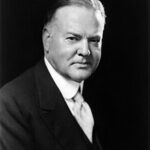The Herbert Hoover Great Depression Response Strategy
When the stock market crashed in October 1929, President Herbert Hoover believed the crisis would be temporary. He rejected direct federal intervention programs. Instead, Hoover promoted voluntary cooperation between businesses and government. His administration maintained faith in traditional laissez-faire economic principles. 📊 Unemployment soared from 3% in 1929 to 25% by 1933.
Failed Policy Implementation
Hoover established the Reconstruction Finance Corporation in 1932. This program provided loans to banks and businesses rather than direct relief. The President opposed federal welfare programs and unemployment insurance. He believed private charities could handle relief efforts. ⚠️ Local governments and private organizations lacked resources for massive unemployment.
Political and Economic Missteps
The Herbert Hoover Great Depression policies emphasized “rugged individualism” over federal assistance. His administration cut federal spending during the economic downturn. Hoover signed the Smoot-Hawley Tariff Act, worsening international trade. 💰 Bank failures increased from 659 in 1929 to 2,294 in 1931. Critics labeled makeshift homeless camps “Hoovervilles” across America.
Impact:
Deepening Economic Crisis
Herbert Hoover Great Depression policies prolonged America’s economic suffering significantly. Industrial production fell 50% between 1929 and 1932. Construction dropped 80% during the same period. 📉 Farm income decreased by 60% as agricultural prices collapsed nationwide. Bank deposits disappeared as over 5,000 banks failed by 1932.
Social and Political Consequences
Massive unemployment created widespread homelessness and hunger across America. Bread lines stretched for blocks in major cities. Families lost homes and farms to foreclosure proceedings. 🔥 The Bonus Army march in 1932 showed growing public anger. Veterans demanding early pension payments clashed with federal troops in Washington.
Long-term Historical Impact
Hoover’s response became synonymous with government inaction during national emergencies. His policies helped Franklin Roosevelt win the 1932 presidential election decisively. The crisis led to New Deal programs expanding federal government power. 🌍 International confidence in American economic leadership declined significantly. Modern economists cite Hoover’s response as evidence supporting counter-cyclical fiscal policy during recessions.
